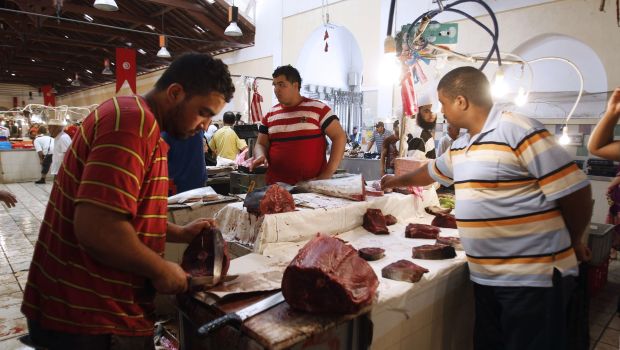
A fishmonger works on the first day of the Muslim holy fasting month of Ramadan, in a market downtown Tunis, June 29, 2014. (REUTERS/Zoubeir Souissi)
In legislation announced at the end of last week, Tunisia’s state budget for 2013/2014 has been slashed by 350 million Tunisian dinars (319 million US dollars), from 28.125 billion dinars (17.578 billion dollars) to 27.775 dinars (17.259 billion dollars).
This comes as the Tunisian government tries to control public spending in a bid to cut a budget deficit projected to reach 8 percent of GDP by the end of the year, and stem rising unemployment.
The government also said it was hoping to use the extra funds to create more job opportunities and reduce the country’s unemployment levels from the 15.9 percent recorded in 2013 to 15.2 percent by the end of the year.
In June it announced plans to raise the private sector minimum wage by 6 percent in a bid to prevent another outbreak of the public unrest which followed previous attempts to cut public spending, when the government raised fuel prices in 2013.
Fuel subsidies are also cut as part of the current bill, with the government raising prices of lead-free petrol 6.3 percent, from 1.57 dinars (0.93 dollars) per liter to 1.67 dinars (0.99 dollars).
The price of diesel also went up, to 1.25 dinars (0.74 dollars) per liter from 1.17 dinars (0.69 dollars), while prices of the low-sulfur diesel fuel went up to 1.50 dinars (0.89 dollars) from 1.40 dinars (0.83 dollars).
Reacting to the move, Hassine Abassi, secretary general of the General Union of Tunisian Workers (UGTT) said that cutting subsidies was “contrary to the obligations and principles of economic dialogue, which requires consensus and coordination, not making unilateral decisions.”
Abassi said the decision would have an effect on the cost of agricultural products and fishing, as well as transport in general, and held the government fully responsible for any resulting negative consequences.
Demand for diesel is high among farmers and fishing boat owners in Tunisia, as well as the public transport sector.
Meanwhile, Tunisian central bank Governor Chédli Ayari said in a statement to the press on Thursday that he expected the Tunisian economy to grow by around 2.8 percent by the end of the year, revising the Banque Centrale de Tunisie’s previous projected growth rate of 4 percent.
Ayari said this rate may grow to reach 3 percent if the country’s important tourism sector and its phosphate exports—two of Tunisia’s most important sources of hard currency —improved by the end of the year.
Ayari, also said, however, this could not be guaranteed since “the Tunisian economy is linked to international markets and relies on exporting to open international markets.”
In June, the World Bank revised its growth forecast for the North African country for the period between 2014–2016 to 2.7 percent from the 2.5 percent predicted in January.
Tunisia’s economy has been battered following the aftermath of the revolution which ousted longtime dictator Zine El-Abidine Ben Ali in 2011, with formerly lucrative sectors such as tourism especially hard hit.
